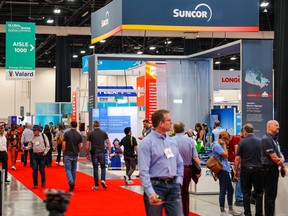
Canada has a looming labour problem in the oil and gas sector, although it’s not the issue the federal government necessarily has in mind with its new Sustainable Jobs Act.
It’s a current lack of people needed to work across the sector as demand for energy heats up, with global oil consumption expected to reach record levels this year and drilling activity rising.
“It’s still a challenge in terms of getting more people into our industry,” Duncan Au, chief executive of CWC Energy Services, said in an interview.
“And I do believe over the medium and longer term, we will (also) have a larger headcount in our industry, despite the things the feds are saying, in terms of the just transition and the labour force …
“Programs that favour one industry over another, such as what the government is suggesting in terms of a sustainable jobs industry, is not helpful to our traditional oil and gas industry.”
The Trudeau government introduced its Canadian Sustainable Jobs Act — formerly called the “just transition” bill — on Thursday and its development is being closely watched by the oilpatch and the Alberta government.
A day earlier, a group of North American industry leaders spoke about the ongoing employment challenges for the sector at the annual Global Energy Show in Calgary.
They detailed the impact of labour shortages and the ongoing issue that companies face finding skilled tradespeople as several large energy projects are being built in Western Canada.
They also discussed the expected wave of retirements coming in the oilpatch, and the difficulty of attracting younger adults to join the industry amid ongoing talk of the energy transition and decarbonization.
Recommended from Editorial
-

‘Non-negotiable’: While Ottawa introduces sustainable jobs act, Premier Smith stands her ground
-

Varcoe: Wilkinson to meet with Smith preaching collaboration, but conflict over energy looms
-

Smith, executives bring energy transition to centre stage at Global Energy Show
-

Varcoe: Smith eyes coalition with other provinces to ‘fight back against Ottawa,’ if required
-

More cost cutting likely as oil and gas companies seek efficiencies: industry experts
“We are in a labour conundrum,” Margie Harris, chief human resources officer at Tellurian, a global gas company and U.S. LNG terminal developer, told the crowd.
“There are lots of shortages going on, and I think what we need to do is figure out how to get that space filled.”
The oil and gas sector has faced worker shortages recently after commodity prices rebounded last year, following Russia’s invasion of Ukraine, and industry capital investment picked up.
Trends such as the Great Resignation, and early retirements seen at the start of the pandemic, have also contributed to a crunch.
Last month, the Canadian oil and gas industry had an unemployment rate of just 4.3 per cent, while almost 168,000 people worked directly in the sector, according to Energy Safety Canada. While layoffs have been confirmed at TC Energy and Suncor Energy in the past month, other companies are looking to add staff.
A report last week from industry group Enserva projected Canadian oil and gas drilling will increase 12 per cent this year from 2022 levels, creating at least 4,000 additional jobs in the country’s oilfield services sector.
“Since 2014, we have been in a period of instability in the industry,” Brian Groody, a vice-president with oilfield services firm Baker Hughes, told the Calgary Energy Show.
“From a service perspective, it makes it very challenging to hire and retain when we’re going up and we’re going down, in terms of the overall industry activity.”

In Western Canada, several major energy projects are moving ahead, including work on the Coastal GasLink pipeline, the Trans Mountain expansion, and the Site C dam in British Columbia, which employed 5,700 workers in April.
Aside from ongoing exploration and production work, the industry will need more workers to build new LNG plants, hydrogen facilities and carbon capture and storage projects in the coming years.
The new federal legislation is focused on the medium and longer term and is intended to help prepare workers and communities for future jobs in a low-carbon world.
The legislation will create a Sustainable Jobs Partnership Council, put out five-year plans on the actions it’s taking, and establish a Sustainable Jobs Secretariat, where employers and employees can access information on federal programs.
“(It’s) about new opportunities, like critical minerals, and hydrogen and biofuels and a range of other things,” Natural Resources Minister Jonathan Wilkinson told reporters in Ottawa.
“But it’s also about ensuring the relevance of Canada’s conventional energy resources as we move through what is a decade’s long transition.”
The new bill will likely come up Monday when Premier Danielle Smith and Alberta Energy Minister Brian Jean sit down for talks with Wilkinson and federal Intergovernmental Affairs Minister Dominic LeBlanc in Calgary.

In an interview, Jean said he’s concerned the legislation will have a “detrimental impact” on industry recruitment efforts with the signal it’s sending out about the future of the oil and gas sector.
And he isn’t convinced with the bill’s intent, nor Wilkinson’s assurances the legislation isn’t about shutting down Canada’s traditional oil and gas sector.
“(It) makes me believe that it is an attack on the oil and gas industry, especially if they say it’s not,” Jean said.
“I just don’t get it. It doesn’t make any sense to me whatsoever … I look at the people, the families, the communities that rely on oil. And what do we do? We penalize those people by accelerating the shutdown, years and years before anybody else in the world is doing it.”
Chris Varcoe is a Calgary Herald columnist.
You can read more of the news on source
